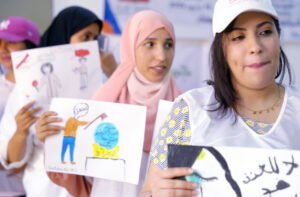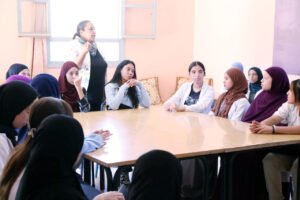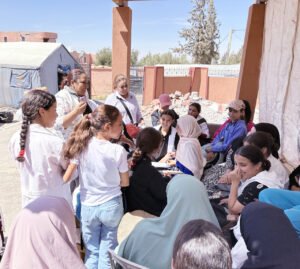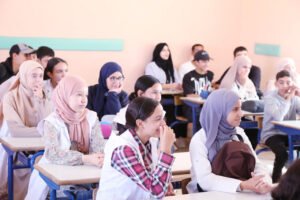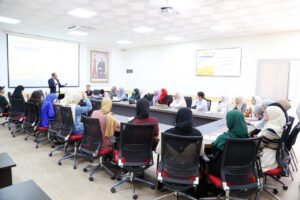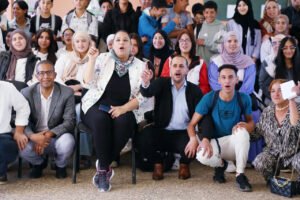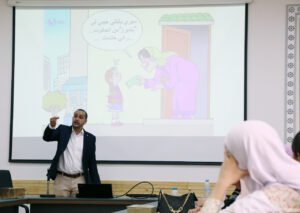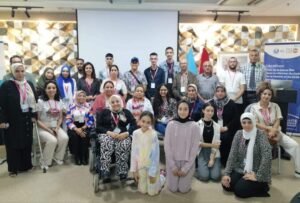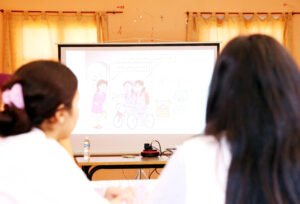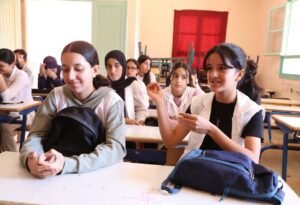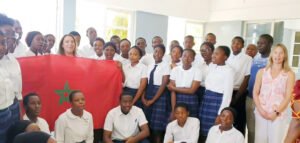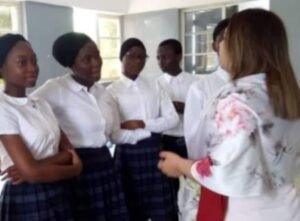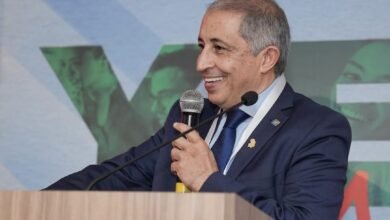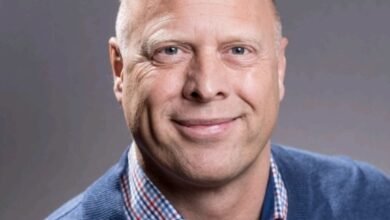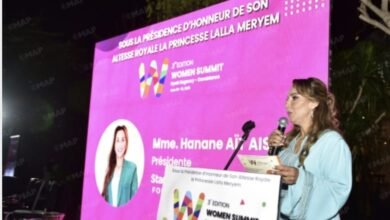Girls Not Brides: Girls in Africa have every right to freely play, explore, learn and grow in safety
Interview with Karima Rhanem, president of the international Center for Diplomacy

Karima Rhanem, public policy expert and president of the International Center for Diplomacy, thinks that Child Marriage is of a great concern in Africa, because girls are violated three times: When you deprive them from childhood and their right to education, when you force them to get married against their will, and when a child who can’t even know her body is carrying another baby, thus impacting her mental and physical health.
She believes that every child must enjoy equal protection and rights not only in law but also in practice. She stressed that girls in Africa have every right to freely play, explore, learn and grow in safety. They have every right to be children. She insists that their place is at school, not in their husband’s house.
She thinks that men’s commitment in CSOs’ advocacy is important for the long fight for equality and mindset and mentality change in order to ensure, policies are effectively implemented in the ground and are positively impacting women and girls’ lives.
Tell us more about the international Seminar on African girls’ empowerment and protection
The International Center for Diplomacy is organizing on October 26, 2024, at the National Library of the Kingdom of Morocco in Rabat an international conference on strengthening South-South cooperation in the field of women and girls’ rights under the theme: Empowering Girls and Protecting Their Rights: A Lever for Development in Africa. This conference is organized in partnership with the United Nations Population Fund (UNFPA), the National Human Rights Council (CNDH), and the International Observatory of Peace, Democracy, and Human Rights in Geneva, the Arab Institute for Human Rights, the Youth for Youth Association, the National Association for Social Assistance in the Justice Sector, The Collectif des Communautés Subsahariennes au Maroc (CCSM), and The New Africa Magazine. Experts from Morocco, Nigeria, Senegal, Chad, Guinea, Mauritania, Tunisia, the Democratic Republic of Congo, and Switzerland will take part to share their experience and expertise on the rights of young girls in the continent.
The conference aims to amplify the voices of African girls, protect their rights, and empower them to become key agents of positive change within their communities. Additionally, it seeks to foster collective reflection on girls’ rights through a comparative legislative lens within the framework of South-South cooperation. The event will facilitate the exchange of experiences and best practices on girls’ rights protection mechanisms, as well as the enhancement of legislation inspired from comparative African legislative practices. Furthermore, the event will highlight lessons learned from successful initiatives to strengthen girls’ rights though enhanced dialogue among experts.
This international conference builds on discussions from the national conference on “Girls’ Rights in Criminal Justice,” held in June 2024 in Rabat. It expands upon the outcomes of the national conference by addressing broader challenges within the context of African cooperation and legislative reforms to promote the rights of girls. Esteemed experts in the fields of law, human rights, health, and sustainable development, as well as representatives from prestigious international and African institutions, will participate to share their perspectives on enhancing the protection of girls’ rights across Africa.
What are the most challenging issues facing girls in Africa?
I think besides access to education and health services challenges, I see that the main issues are related to gender-based violence and sexual reproductive health. Child Marriage is of a great concern in Africa, because girls are violated three times: When you deprive them from childhood and their right to education, when you force them to get married against their will, and when a child who can’t even know her body is carrying another baby, thus impacting her mental and physical health. Child marriage often leads to school drop out and domestic violence.
Out of the 700 million women and girls married by the age of 18, 17% or 125 million live in Africa. One in three young women in Africa were married or in union by the age of 18. Over the past three decades, child marriage has been on the decline across Africa but progress is uneven. While we are seeing a fast decline in North Africa, the practice is on the rise in Western and Southern Africa. High levels of child marriage persist among the poorest families and communities, with progress limited to the richest. Child marriage rates in Western, Central and Eastern Africa are higher than the global average. As Africa’s population grows, millions of girls will be at risk of child marriage. This means that, if current rates continue, Africa will have the largest number of child brides by 2050
Girls who enter marriage at a young age often experience serious socioeconomic hardship afterwards, including limited opportunities in education, domestic violence, and serious health challenges.
Young adolescents face a higher risk of complications and death as a result of pregnancy than other women.
How alarming is the situation of child marriage in Africa?
Save the Children’s latest Global Girlhood Report 2024: Fragile Futures released on International Day of the Girl, revealed devastating link between child marriage and fragile states. It showed that a girl is married every 30 seconds in countries ranked as fragile states and with high child marriage rates, with about 32 million adolescent girls living in these emergency hotspots.
Nigeria for example is home to the largest number of child brides in Africa: a massive 23 million girls and women were married as children.
While several countries have set the minimum age of marriage is 18, several are still opening up for exceptions, giving more judicial discretion power to judges to deliver authorization to marry minors. Others have limited the exceptions to a minimum of 17. However, the exceptions have become the practice leading to an increase in child marriage despites complementary efforts being done to enforce education, support families to fight poverty…
I commend, though, the courageous decision of Sierra Leone’s parliament who has approved a law banning child marriage, seen as a major win for children’s rights.
I believe, every child must enjoy equal protection and rights not only in law but also in practice. Girls in Africa have every right to freely play, explore, learn and grow in safety. They have every right to be children. Their place is at school, not in their husband’s house.
You have organized a caravan to raise awareness about child marriage and menstrual hygiene in Morocco’s earthquake impacted area
In September, the International Center for Diplomacy with UNFPA support has led a campaign in El Haouz region, an area that was badly hit by the 2003 earthquake. The aim of this caravan was to raise awareness among young girls, women, educators, and local leaders about the importance of menstrual hygiene and reproductive health in addition to the dangers related to child marriage. The initiative highlighted the urgency of breaking the taboos surrounding menstruation and child marriage through awareness-raising actions on the ground. The caravan’s activities focused on key themes such as the fight against child marriage, sexual and reproductive health, and personal hygiene during menstruation. The interactive workshops, held in schools and universities in El Haouz and El Kelaa des Sraghna, helped normalize the discourse on menstrual health and promote gender equality. Particular emphasis was placed on educating young people in the regions affected by the 8 September earthquake in El Haouz, offering them clear information on the use of hygiene products and access to menstrual care.
The ultimate goal of these actions was to bring about lasting social change, by deconstructing gender norms and establishing an inclusive dialogue that recognizes menstruation not only as a biological phenomenon, but also as a human rights issue. The active participation of boys and men has been encouraged, raising awareness of their role in combating gender stereotypes and increasing their commitment to equality. Policy recommendations were made to improve access to menstrual care, education, and legislation, with specific proposals for crisis and disaster situations. These initiatives aim to ensure that menstrual hygiene is recognized as a priority public health issue and to put in place concrete measures to protect the rights of girls and women. In addition, a Policy brief was developed following a reflection on proposals and recommendations for addressing issues related to menstruation in laws and public policies such as providing menstrual paid leave and reducing taxes on menstrual products to fight menstrual poverty.
To what extent these awareness raising campaigns are effective in changing mentalities
Changing mentalities take time. We previously organized a Caravane called Ride4InclusionEquality which reach out to more than 1000 people in three main cities Casablanca, Beni Mellal and Azilal.
The Ride4Inclusion&Equality Caravan under the theme: The Morocco We Want: Without Violence, Without Discrimination aimed to promote equality through initiatives led by men and boys, by strengthening positive masculinity and responsible parenting.
The caravan through its various awareness-raising actions through debate, art, and theater recommended the legal recognition of the domestic work of women heads of household while strengthening their social protection, the implementation of programs aimed at the fight against women’s economic violence, the facilitation of legal assistance procedures for vulnerable groups and the procedures for obtaining alimony, and the promotion of a family model where responsibilities are shared equitably, promoting harmony and well-being for all members through educational programs and media stories.
Five initiatives led by men have already been launched as part of the awareness-raising actions, namely:
Road Brothers (Male Bikers) have signed a charter of commitment for equality as part of the Ride4InclusionEquality Caravan, a charter of commitment has also been signed by the (male) social workers in the justice sector in order to promote the social integration of women from disadvantaged backgrounds, by informing them of their social rights, remedies and possible assistance, and by facilitating their procedures, the National School of Business and Management (ENCG-Casablanca) has signed a declaration for the promotion of women’s rights and the strengthening of positive masculinity,
the Dean of the Faculty of Legal, Economic and Social Sciences in Kelaat Sraghna has signed a partnership with ICD, including the creation of Clubs dedicated to the promotion of equality and scientific research on the economic empowerment of women heads of households, and finally, the Moroccan Democratic Center for Studies and Research has signed a charter for the creation of research labs on equality and positive masculinity and on the empowerment of women heads of households.
For us, these commitments are important for us in our long fight for equality and mindset and mentality change in order to ensure, policies are effectively implemented in the ground and are positively impacting women and girls’ lives.
How do you perceive the role of women in leadership, particularly in Northern Africa?
Women have always been leaders of change in Africa, whether in government, businesses and non-profit. They have contributed to leading change across all sectors. women continue to be vital in crafting complex responses to complicated problems. We have seen this in Covid-19 crisis where women were at the frontlines as medical and health experts and community healthcare workers, we have seen it in civil war outbreaks and important political movements in several African Countries, we have seen it during natural disasters driven by climate change. Despite their leadership, women continue to be underrepresented in official roles. In several African Countries, women occupy mostly less than 26% of the parliamentary positions and roughly less than 7% of heads of states or heads of government positions and less than 22% in cabinet positions.
Regardless of the efforts that have been done by several government including Morocco to promote women in senior level positions, we are still faced by a masculine mentality that impedes any initiatives to mainstream gender at social and institutional level. Rwanda remains of the leading examples in women leadership across the continent. In addition, Africa is one of the continents that faces security challenges. Yet, only a tiny percentage of women are playing a key role in peace and security as negotiators or mediators regardless of the more than 23 years of implementation of the UN Resolution on women, peace and security. In recent years women in Algeria, Egypt, Morocco and Tunisia have secured more rights, greater access to education and a modest increase in their political representation.
Share an instance where you’ve actively promoted women’s involvement and empowerment.
In 2023, I have led a national project with the United Nations Fund for Population to bring the voices of young girls in the current reform of the family and penal codes. At the International Center for Diplomacy, we have been able to mobilize more than 250 stakeholders including young girls aged 15-24 to debate changes to the legislation to promote more gender-sensitive laws based on equality and human rights. We have been able to reach out to more than 110 decision makers including government officials and members of the parliament. We have empowered young girls to produced policy briefs highlighting their main proposals which included ending child marriage, granting children rights to filiation regardless of the status of their parents, adopting joint custody and guardianship of both the father and the mother, incorporating specific rights to people with disability and migrants and diaspora related to marriage and divorce procedures and promoting equality and positive masculinity among others. Young girls have also worked on two policy advocacy memoranda related (1) to the family code reforms, (2) the protection of the rights of young girls in natural disasters and humanitarian crisis focusing on the Al Haouz Earthquake that hit Morocco in September 8, 2023.
We have managed to bring comparative experience highlighting cases from other African countries such as Tunisia, Nigeria and others to document best practices and lessons learned within the framework of South South Cooperation. I am so proud I have managed to coach a group of young girls to present their proposals at the parliament, to government officials including ministers and to the Royal Commission in charge of revising the Family Code. Another aspect of this project is the use of Arts and Culture to promote young girls’ rights through the development of plastic arts work, pencil drawing, caricatures, which were projected during the UN campaign of 16 days of activism against Gender-Based Violence.
I am also leading another project on water diplomacy which focuses on water scarcity and its impact on human rights while giving much more importance to women. This project is promoting the key role women can plan in water management, water awareness and water conflict management.
I am currently active in the We-Men Engaged for Change Coalition which is the first coalition of the kind working on the Nexus Gender, Population and Climate Change. I am also happy to have contributed to launching the first coalition for the protection of young girls in Morocco.
What is your vision for the future of women in leadership in Africa?
I believe it is high time to increase women leadership in senior level positions and increase up to 50%. Women are the backbone of African society. Sustainable development today needs more women to lead change and sit in the negotiation table to manage climate change impact, energy, water and food security issues and to be hand in hand with men to manage any crisis that may happen in the future. We can not have resilient societies today without ensuring gender equality. Therefore, a big change in mentalities need to happen to end all those cultural barriers that are still preventing women from reaching all their potential.

